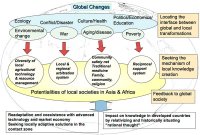Initiative4: Studies in the Potentialities of Local Culture, Institutions and Technology
Details
This initiative aims to discover and understand the intellectual potentials of local and regional cultures in our attempt to pursue a path of development based upon sustainable humanosphere. Intellectual potential here refers to indigenous knowledge-concepts, practical knowledge, ecological and social relations, values, institutions, techniques and technologies - historically accumulated in the various localities and regions of the world. When combined with contemporary scientific knowledge and socio-political institutions, it has the capability of supporting and creating a paradigm of sustainable humanosphere.
Sustaining the life basis for human existence (i.e. humanosphere) first requires the establishment of technologies and institutions for resource recycling. Cooperation and coordination between area studies and frontier sciences is essential for this purpose. Local peoples have also created unique technologies and cultures in their interaction with their environments over long periods of history. This experience is an equally essential component in the creation of the new paradigm.
In short, building a sustainable humanosphere requires the construction of recycle-oriented socio-technological systems suited to the particular environment of a locality or region by incorporating high scientific knowledge with indigenous intellectual potentials.
Development based upon a sustainable humanosphere means improving the quality of life within such recycle-oriented living practices and systems. Life, after all, is sustained through the interaction between humans, animals, plants and with the environment. Production, consumption, reproduction and death all involve such socio-ecological interactions. Development based upon a sustainable humanosphere thus seeks to improve quality of life not necessarily by increasing production or efficiency, but by enriching the quality of the social and ecological interactions and relationships.
To achieve this, we must leave behind the idea of possessing and utilizing nature for production and the presupposition that there is an ecologically, socially autonomous and closed system in a particular region. We must understand the recycle-oriented structure of materials and energies of the humanosphere as a whole, establish technologies and institutions that address this nature, in accordance with idiosyncrasies of a locality or region. At the same time, we must investigate the meanings and values of the environment for people living in different situations so that we can learn about the rich potentials of our relationships with the environment and utilize them as cultural resources for humanity's well-being. What is required is to understand the multiple and deterritorialised networks of relationships in this globalizing world and the interactive dynamics they generate. From here we can then go beyond the current and more conventional dichotomies of nature and culture, and global and local.
The intellectual potentials of local and regional cultures manifest in the contact zones between indigenous and imported knowledge. We submit that the clues for a new paradigm lie at the core of these realities in the field. In this research group, we will focus on the following fields of study: "nature and environment," "war and conflict," "health, religion and happiness," and "political economy and education." In these fields of study, we aim to find out and analyze the endogenous and creative social movements that address the above issues, discover potentials for the development based upon a sustainable humanosphere, and investigate the theoretical and practical possibilities for imagining a new paradigm that combines the intellectual potentials of local and regional cultures with frontier sciences and contemporary social thought.
TANABE, Akio


